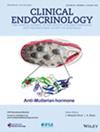Unveiling Gastrointestinal Involvement in Hypopituitarism: Clinical Features and Treatment Approaches
Abstract
Background
Hypopituitarism, characterized by the deficiency of one or more pituitary hormones, can lead to diverse gastrointestinal (GI) manifestations that are often under-recognized, particularly in elderly patients. These symptoms, ranging from nausea and constipation to severe complications like malabsorption and hepatic dysfunction, can significantly impact patient outcomes if not addressed promptly.
Objective
This review aims to elucidate the GI implications of hypopituitarism, focusing on the clinical features, underlying mechanisms and therapeutic approaches, with an emphasis on hormone replacement therapy (HRT) and its potential benefits and risks.
Methods
A comprehensive literature review was conducted to explore the relationship between pituitary hormone deficiencies and GI function. The study synthesizes findings on how deficiencies in growth hormone (GH), adrenocorticotropic hormone (ACTH), thyroid-stimulating hormone (TSH), gonadotropins, prolactin and arginine vasopressin affect gut motility, nutrient absorption and overall GI health. Relevant studies were identified through database searches, and clinical evidence was evaluated to highlight diagnostic and therapeutic strategies.
Results
GI manifestations in hypopituitarism include nausea, vomiting, constipation, malabsorption, intestinal pseudo-obstruction and hepatic dysfunction, driven by specific hormonal deficiencies. GH deficiency impairs gut motility and mucosal integrity, ACTH deficiency leads to nausea and nutrient malabsorption, TSH deficiency causes slowed GI transit and arginine vasopressin deficiency contributes to dehydration-related constipation. HRT, including hydrocortisone, levothyroxine and GH, can alleviate these symptoms, but overtreatment may result in adverse effects such as gastric ulcers, diarrhoea or hyperglycaemia. Multidisciplinary management, including nutritional support and symptomatic treatment, is crucial for optimizing outcomes.
Conclusion
Hypopituitarism significantly impacts GI function, necessitating increased clinical awareness for timely diagnosis and management. Tailored HRT, combined with vigilant monitoring for overtreatment and lifestyle interventions, can effectively address GI symptoms and improve quality of life. Further research is needed to clarify the mechanisms linking hormonal deficiencies to GI dysfunction and to refine therapeutic strategies.


 求助内容:
求助内容: 应助结果提醒方式:
应助结果提醒方式:


